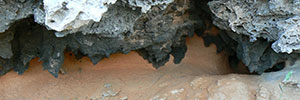About Us
70th Anniversary of the Geological Institute: Activity Team Priorities Structure
The Geological Institute has been the main leading unit in the field of Earth Sciences at the Bulgarian Academy of Sciences for more than 70 years. Here scientific and scientific-applied researches are carried out on all important for Bulgaria aspects of the geological science. In recent years, the Institute has formed as the largest national geological research and expert organization in the country. It combines both the classical directions of geology and today's priorities in the field of Earth sciences.

Research Activity
The main research activities at the Institute are related to the study of the terrestrial environment on the territory of Bulgaria with the main goal of supporting the sustainable development of modern society and conflict-free mitigation of the consequences of natural risks.
Since the first year of the institute's establishment, the researchers have conducted educational activities and developed international scientific cooperation together with the work of scientific tasks directly related to the needs of the national economy and society.
Scientists from the Institute have been and are leading university’s professors, supervisors of a significant number of graduates and doctoral students. Today, the research associates of Geological Institute represent Bulgaria in over 20 international scientific and expert organizations. The Geological Institute was established in September 1947. In just a few years it has established itself as an institute of national importance, which lays the scientific foundations for complex research and study of Bulgarian geology in all major areas - paleontology, stratigraphy, tectonics, mineralogy, geochemistry, petrology, hydrogeology and engineering geology. The creative scientific atmosphere and the academic style, imposed by the first leaders - Acad. G. Bonchev and Acad. Str. Dimitrov, from the very beginning attracted almost all leading geologists in our country to work at the Geological Institute - Acad. Bonchev, Acad. Iv Kostov, Acad. T. Nikolov, Acad. Il. Bruchev, Corresponding Member V. Tsankov, Corresponding Member B. Kamenov, Corresponding Member M. Minkov, Prof. Hr. Spasov, Prof. J. Mincheva-Stefanova. Maintaining high professionalism and competence of the scientific staff is a prerequisite for the Geological Institute to be a key unit in the implementation of almost all important for the country scientific and applied activities in the field of geology in the second half of last century. These include:




Publishing Activity
Soon after its establishment, the Institute began publishing a number of scientific journals. Initially, the Bulletin of the Geological Institute was published - from 1951 to 1974, which later passed into 6 specialized series. In the period 1959-1966 "Works on the Geology of Bulgaria" were published in five specialized series. Currently, the journal Geologica Balcanica and the series Geochemistry, Mineralogy and Petrology and Engineering Geology and Hydrogeology are published regularly, and the BGD Journal is published jointly with the Bulgarian Geological Society.
Scientific Team
Currently, the Geological Institute consists of about 110 employees, of which 69 scientists. This includes 1 corresponding member, 13 professors, 12 associate professors, 17 research assistants. Of these, 2 doctors of science and 56 doctors. The Scientific Council consists of 23 people and has delegated rights from the Higher Attestation Commission for habilitation in 8 scientific specialties in the field of geological sciences. The institute is accredited by the National Agency for Evaluation and Accreditation to train doctoral students in 10 specialties.
Scientific Priorities
The research activity is focused on two basic scientific priorities, which are largely interconnected and complement each other:
Scientific Structure
The structure of the Institute consists of eight scientific sections, one laboratory and one experimental base, as follows:
Laboratory sector "Geolab" is equipped with one of the best laboratory equipment in our country to study the chemical and mineral composition, physical and mechanical properties of rocks, minerals and soils.
Information sector, which includes a local computer network with about 120 workstations and a library with over 80,000 titles.